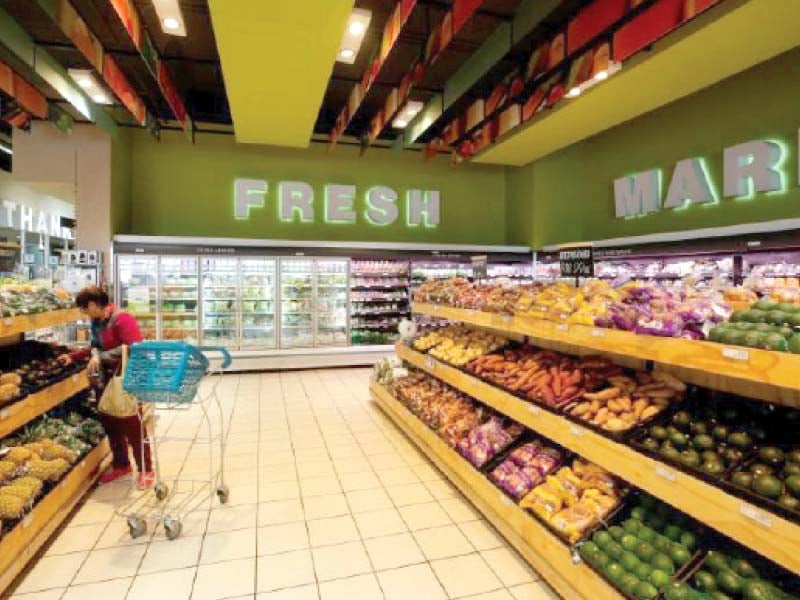
The federal government has again agreed to give tax concessions to Pakistan’s big retailers in return for their commitment to documenting their businesses, indicating the authorities’ weaknesses in enforcing the law.
According to the deal, the government would reduce tax rates through amendments to the Income Tax Ordinance at the first available opportunity, either when a mini-budget is presented or if no mini-budget is introduced then at the time of next budget, sources said.
The agreement had been reached between Pakistan’s retail chain stores and the Federal Board of Revenue (FBR) this week, representatives of traders and officials of the FBR confirmed to The Express Tribune.
FBR Member Operations Mohammad Ashfaq, who is supposed to enforce the law, agreed to these concessions on behalf of the revenue board.
It is for the second time in the past seven months that the FBR and large retail chain stores have reached an understating. The first deal has remained unimplemented.
Sources said the FBR had again agreed to relax the audit condition and reduce income tax rates in return for documenting retail sales.
The FBR has entered into the deal with large retailers on the Point of Sales (POS) installation - a real-time invoicing system for documentation of sales being installed by large retail stores across Pakistan.
As part of the deal, the FBR has extended the deadline for online integration of Pakistan’s large retail chains till the end of November, which had earlier to be implemented from December 2019.
The integration of retailers with the FBR’s online system has been dubbed as a big reform by the government of Prime Minister Imran Khan. But the reform has so far remained on paper with little progress on the ground.
Provisions for the mandatory integration of retailers were introduced in the Sales Tax Act 1990 through the Finance Act 2019, and proper rules were laid down.
Live integration was operationalised with effect from November 1, 2019 but by the end of August, the FBR had hardly integrated the retailers with its real-time invoicing system for documentation of sales.
The wholesale and retail sector contributes about 19% to the national output but its share in tax collection is just 3.7% of the total collection.
The previous Pakistan Muslim League-Nawaz (PML-N) government had also tried to bring retailers, including tier-II retailers, in the tax net but no progress was made. This time, the FBR is largely targeting tier-I retailers that do business in mega shopping malls and run store chains.
The FBR has accepted the demand of not opening the books of large retail stores for the past up to six years, according to the retailers.
It is not clear whether the FBR took the International Monetary Fund (IMF) into confidence before striking the deal.
Earlier in March this year, the FBR had accepted their demand to halve the minimum income tax from 1.5% to at least 0.7%. Similarly, the FBR also agreed to reduce the withholding tax from 4.5% to 1.5%.
However, due to opposition from the IMF, the package could not be given legal cover in the budget.
“The FBR has accepted our seven demands and a formal agreement will be signed on coming Thursday,” said Irfan Iqbal Sheikh, former president of the Lahore Chamber of Commerce and Industry (LCCI), while talking to The Express Tribune.
“After the MoU reached in March, the new FBR team backtracked from commitments but we have now again activated the process with the help of Industries Minister Hammad Azhar,” Shaikh added.
The FBR did not accept the demand of relaxing the condition of maximum cash expenditure above the existing threshold of Rs250,000, according to the FBR officials. They said the demand was against the spirit of documentation of the economy.
“The FBR has agreed that it will not perform an income tax audit of the last five years and sales tax audit of the last six years,” Shaikh said, adding, “The FBR has also agreed to extend the deadline for linking the POS till November 30.”
In return for these concessions, the large retail chains will ensure compliance and install the POS system.
“There is also a realisation in the FBR that things cannot move forward without implementing these points, irrespective of whether the IMF agrees to it or not,” said Shaikh.
He said there were also problems with the FBR’s POS model designed to cater to the needs of textile sector outlets. He was of the view that some changes would have to be introduced for integrating the departmental stores.
They extended the deadline multiple times to electronically integrate tier-I retailers with the FBR’s online system, which ended in August without success. As against 7,834 POS, less than 600 or about 7.3% could be registered, according to the FBR officials.
Out of these 600 taxpayers who opted to register with the FBR, the retailers who were configured with the FBR’s data system were not more than 500 of the big retailers doing business in Pakistan.
Published in The Express Tribune, October 18th, 2020.
Like Business on Facebook, follow @TribuneBiz on Twitter to stay informed and join in the conversation.


















COMMENTS
Comments are moderated and generally will be posted if they are on-topic and not abusive.
For more information, please see our Comments FAQ